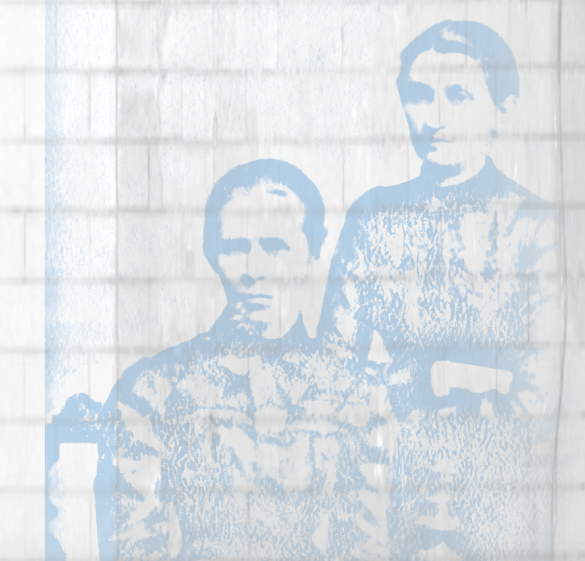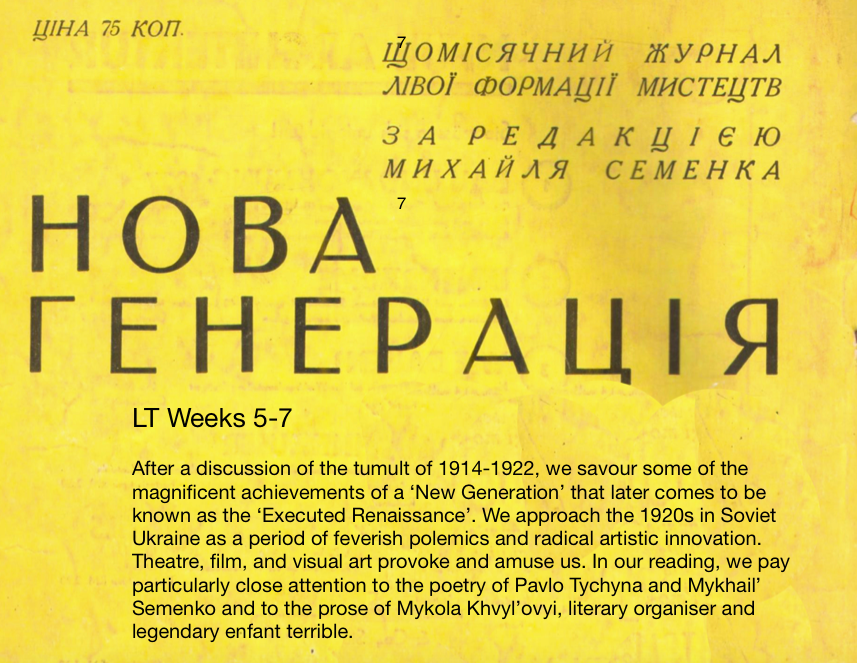This paper is available for the academic year 2025-26.
Ukraine is the largest country within the European continent, and today it is in the grip of a war of genocidal aggression waged by the Russian Federation. This is a war between democratic freedom and authoritarian tyranny, affecting us all -- and making a knowledge of Ukraine an urgent necessity for any student and scholar. This paper equips you with a methodological toolkit to understand Ukraine’s remarkable historical emergence and introduces you to its rich language, literature, and culture.
Ukraine owes its very existence to works of culture. Particularly in the early- and mid- nineteenth century, these humorous, tortured, satirical, sublime texts cultivated the idea of freedom at odds with aristocracy to the west and autocracy to the east. In this paper, you will explore these works while grappling with an extraordinary history that saw a modern nation defy sociopolitical gravity and evolve out of the periphery of three empires to establish a sovereign, independent state. You will trace the development of today's Ukraine from the burlesque travesty of Kotliarevs'kyi to the passionate Romanticism of Shevchenko, from the feminist stories of Kobylians'ka to the postcolonial novels of Kurkov. You will recite poetry, debate novels, unroll canvasses, reinterpret folksongs, rekindle debates among the avant garde -- all the while acquiring a command of the fundamentals of the Ukrainian language.
Download the paper prospectus here or browse below.
Who can take paper SL9?
This paper is open to all MMLL and HML students and available in both Part IB and Part II. No previous knowledge of Ukrainian is expected or required.

Rise MT Weeks 1-2
In this first section, guided by the figure of the mysterious Kozak Mamai, we rush headlong into the complex and contested history of the territory now known as Ukraine. We explore the legacies of the era of (Kyivan) Rus’; tour the Cossack Baroque; and witness the loss of 17th-/ 18th-century Ukrainian political autonomy. This history may seem distant and arcane to some. But it has profound implications for coming to grips with Russia’s war of aggression against Ukraine today.
Riot MT Weeks 3-4
Here we relish the first work of modern Ukrainian literature: Ivan Kotliarevs'kyi's erudite, manic and ribald travesty (mock epic) Eneida of 1798. We then take stock of the lasting influence of Ivan Kotliarevs’kyi’s portrayal of modern Ukrainian culture in the works of his epigones (‘poor’ imitators), the so-called kotliarevshchyna. Among these writers was a young man from the Poltava region: Nikolai Gogol’. In reading these selected works, we seek to understand the interest of the imperial centre in the culture of the Ukrainian ‘periphery’ — as well as the periphery’s interest in selling (out?) its culture to the centre.
Rebel MT Weeks 5-6
In this section we ascend to the heights of Romanticism in Ukrainian literature, which was led by the serf-turned-painter-cum-poet-turned-national prophet Taras Shevchenko. The movement marks a crucial shift in the development of Ukrainian national culture from a discourse largely oriented toward the entertainment of imperial elites in St Petersburg and Moscow to a discourse oriented toward the edification and mobilisation of the Ukrainian gentry. The movement was committed to lofty artistic expression in the Ukrainian vernacular and to the promotion of a Ukrainian identity that would inspire pride and passion - as well as a new politics.
Representation MT Weeks 7-8
As a visual artist, Shevchenko had a motto: ‘Ні однієї риски без натури’ (Not one line removed from nature). In the realm of literature, Marko Vovchok and Ivan Franko turned this maxim into a call to social action. They were at the vanguard of a Realist aesthetic that sought to shame elites with no-holds-barred representations of systemic oppression of the poor and the marginal. In this section, we hold tightly to our maps and discuss the divergent historical experiences of Ukrainians in both the Russian Empire and the Austro-Hungarian Empire in the mid- to late- 19th-century.

Rejection LT Weeks 1-2
Three audacious cultural rebels and risktakers — Lesia Ukrainka, Ol’ha Kobylians’ka, and Mykhailo Kotsiubyns’kyi — rejected ‘worn-out tendencies and compelling morals’ in favour of ‘works with a free, independent outlook’ (Mykola Voronyi, 1901). They chased the idea of Europe toward new modernist horizons, championing a pioneering feminism along the way.
Renaissance LT Weeks 3-4
After a discussion of the tumult of 1914-1922, we savour some of the magnificent achievements of a ‘New Generation’ that later comes to be known as the ‘Executed Renaissance’. We approach the 1920s in Soviet Ukraine as a period of feverish polemics and radical artistic innovation. Theatre, film, and visual art provoke and amuse us. In our reading, we pay particularly close attention to the poetry of Pavlo Tychyna and Mykhail’ Semenko and to the prose of Mykola Khvyl’ovyi, literary organiser and legendary enfant terrible.

Repression LT Weeks 5-6
In this section we get to know the ‘60ers’ in Ukrainian culture, a generation of writers and artists who fought back against forces of authoritarian repression by rousing the individual ‘I’ out of the conventional Soviet ‘we’. We examine the phenomenon of political ‘dissidence’ and consider the use of literature as a form of action in defence of freedom, equality, and a universal respect for others.
Return LT Weeks 7-8
The final section of Lent Term explores the return of sovereignty and independence to Ukraine. We navigate the cultural explosions after 1991 through Andrei Kurkov and his shape-shifting Russianlanguage work. We then confront the tumult and tragedy of revolution, annexation, and war between 2013-2021, which placed Ukraine on the perilous frontline of a global contest between democracy and autocracy, transparency and corruption, and truth and ‘post-truth’.
Resistance ET Weeks 1-2
We conclude SL9 with difficult discussions about the role of culture in resisting a war of aggression and conquest in the twenty-first century. We reflect upon Ukraine’s vibrant civic national identity and consider the lessons of Western blindness and ignorance of its existence before 2022. Above all we look ahead and focus on Ukraine’s future.
I can’t wait to get started. What can I do over the summer?
Prior to the beginning of the Michaelmas term, you are encouraged to read Ukraine: Birth of a Modern Nation by Serhy Yekelchyk (Oxford 2007) or The Gates of Europe: A History of Ukraine by Serhii Plokhy (London 2017). For an engaging example of the kinds of close reading we will be engaged in, check out James Wood’s How Fiction Works (London 2008), especially pp. 5-31 and 48-161.
Students are strongly encouraged to study as much basic Ukrainian grammar as possible before starting Paper SL9. In preparation for Ukrainian language classes:
1. Familiarise yourself with the Ukrainian alphabet. Ukrainian uses the Cyrillic alphabet but has several differences from Russian, Bulgarian, or other languages that use Cyrillic letters. Use the online resource Read Ukrainian!, which has been developed by a team led by our friend Marta Jenkala, to learn and practice the alphabet and make sure to go through the entire Unit 1.
2. Continue your familiarisation with Ukrainian by using Read Ukrainian! and proceed at least to lesson 5 in Unit 4. Use exercises to practice your Ukrainian.
3. Build your vocabulary. Use these lists of essential Ukrainian words and begin to memorise them.
4. Try to study Ukrainian in your free time. Start a duolingo account and listen to the Ukrainian Lessons podcasts produced by Anna Ohoiko. Students who have no previous knowledge of any Slavonic language are especially encouraged to watch our short Cambridge introductory course in Ukrainian.
How is Paper SL9 organised?
Lectures meet weekly; supervisions meet fortnightly. These sessions offer you a command of Ukrainian history, culture, and society. Our abiding task will be to explore the play of form and content in cultural texts and to consider their ‘experienceability’. What demands does a text make on the reader? How does the text ‘speak’? To whom? Building up capacity as we go, we will read in the original Ukrainian. But due to the introductory nature of this paper, we also supplement each text in the Ukrainian original with one in English translation for your reference. All texts are either available on Moodle or in the MMLL Library.
Language classes meet twice weekly. These sessions, designed for those with very little or no knowledge of Ukrainian, introduce you to the fundamentals of the language. You will learn the principal grammar structures and vocabulary and acquire a basic proficiency in reading and speaking Ukrainian. Spoken by over 40 million people around the world, Ukrainian is the official state language of Ukraine. For centuries its very existence was under threat from Russian Imperial and Soviet authorities; today, from the cafes of L'viv to the boulevards of Kyiv and Odesa, it is experiencing an urgent revival.
Students interested in booster language provision can also join the weekly language classes in Ukrainian open to all members of the University.
What is the format of the exam?
Part IB and Part II
will be adopting the following format:
· language component: in-person exam, same format and duration as last year (1.5 hrs)
· literature/culture component: to be assessed by way of a timed online exam; 3 hours for two essays
For more information, please visit www.CambridgeUkrainianStudies.org and connect with us on Facebook, Twitter, or Instagram.
Prof Rory Finnin | |
Mr Andrii Smytsniuk |





